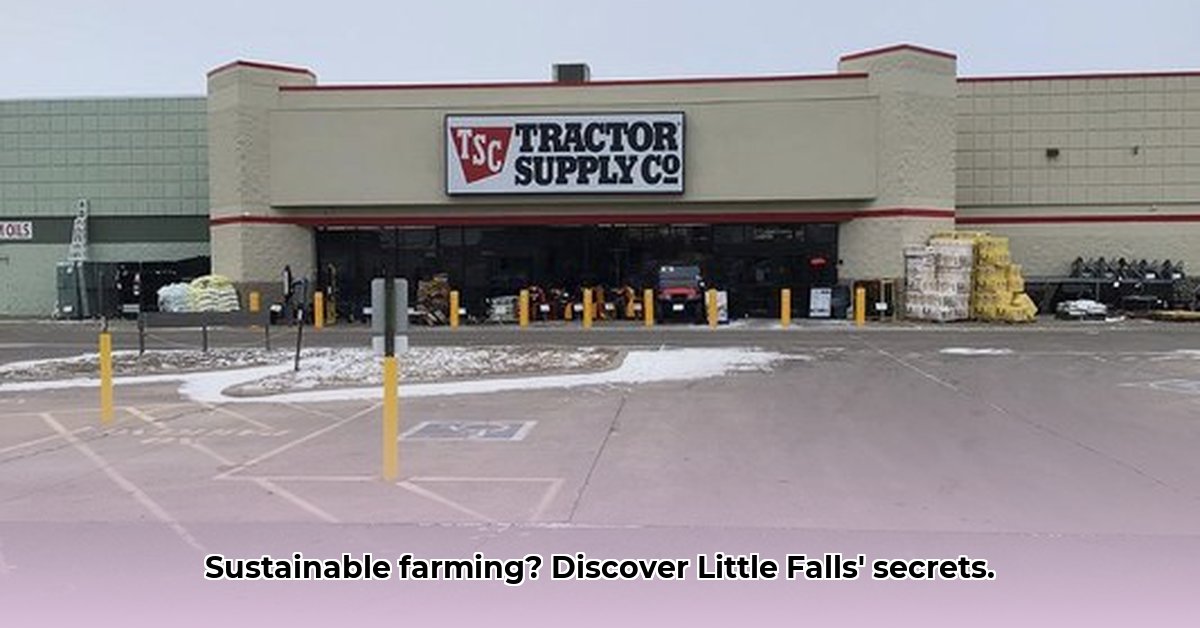
Assessing Tractor Supply Company's Role in Sustainable Agriculture in Central Minnesota
Tractor Supply Company (TSC), with its Little Falls, Minnesota location, plays a complex role in the region's sustainable agriculture efforts. While not directly involved in farming practices, its accessibility and product offerings significantly influence the ability of local farmers to adopt sustainable methods. This analysis examines TSC's current contribution, identifies areas for improvement, and proposes actionable steps for all stakeholders. For more information on TSC's operations, see their company website.
Accessibility and Product Availability: A Mixed Picture
TSC's widespread presence in Minnesota enhances accessibility for farmers, particularly those in smaller towns. However, the availability of specifically sustainable agricultural inputs at the Little Falls store requires further investigation. A comprehensive inventory analysis, coupled with farmer surveys, is needed to determine the range and demand for organic seeds, sustainable fertilizers, and environmentally friendly pest control options. This data gap currently limits a definitive assessment of TSC's direct impact.
Actionable Strategies for Sustainable Growth
To maximize TSC's contribution to sustainable farming, a multi-pronged approach involving farmers, TSC, and government agencies is crucial.
For Tractor Supply Company (TSC):
Short-Term (Next Year): Conduct detailed farmer surveys to identify high-demand sustainable products. Analyze sales data of existing eco-friendly products to pinpoint areas of success and improvement. Partner with local agricultural organizations to raise awareness of sustainable farming practices.
Long-Term (3-5 Years): Publish a comprehensive sustainability report outlining environmental commitments. Invest in research and development of improved eco-friendly products. Expand the range of sustainable product offerings to provide greater choice to farmers. Implement a robust Environmental, Social, and Governance (ESG) framework to bolster credibility and attract environmentally conscious customers.
For Minnesota Farmers:
Short-Term (Next Year): Utilize TSC's convenient location to access available sustainable resources. Participate in workshops and educational sessions on sustainable agriculture techniques. Provide feedback to TSC regarding desired sustainable product offerings.
Long-Term (3-5 Years): Gradually integrate sustainable farming practices into operations. Explore grant and subsidy opportunities to fund the adoption of sustainable technologies. Implement carbon sequestration techniques to reduce environmental impact and potentially generate additional revenue.
For Government Agencies:
Immediate Actions (Next Year): Offer financial incentives and educational resources to support the adoption of sustainable practices among farmers. Collaborate with retailers like TSC to increase the availability of eco-friendly farm supplies. Develop and implement policies promoting sustainable agriculture.
Long-Term Policies (3-5 Years): Maintain investment in research and development of sustainable technologies. Create comprehensive policies that encourage sustainability throughout the agricultural sector, fostering a supportive environment for long-term success.
Risk Assessment and Mitigation
Understanding potential risks is crucial. Here's a preliminary risk assessment:
| Risk Factor | Likelihood (High/Medium/Low) | Impact (High/Medium/Low) | Mitigation Strategy |
|---|---|---|---|
| Limited Sustainable Product Range | Medium | Medium | TSC expanding product lines; government incentives for sustainable product innovation. |
| Farmer Awareness/Adoption | Low | Low-Medium | Targeted educational programs; marketing campaigns promoting sustainable practices. |
| Supply Chain Disruptions | Low | High | Diversifying suppliers; securing long-term contracts with reliable, ethical suppliers. |
| Climate Change Impacts | High | High | Government support for climate-resilient agriculture; adoption of innovative farming methods. |
Navigating the Regulatory Landscape
Compliance with regulations regarding organic farming, pesticide use, water conservation, and carbon emissions is paramount. Thorough understanding and adherence to these regulations are critical for TSC, farmers, and the overall sustainability of the agricultural ecosystem.
This analysis highlights the potential of TSC to contribute to sustainable farming in Central Minnesota. However, further research—particularly regarding product availability and farmer needs—is crucial to develop more effective strategies for promoting and scaling sustainable agricultural practices. The combined efforts of all stakeholders are essential to create a thriving and environmentally responsible agricultural future.